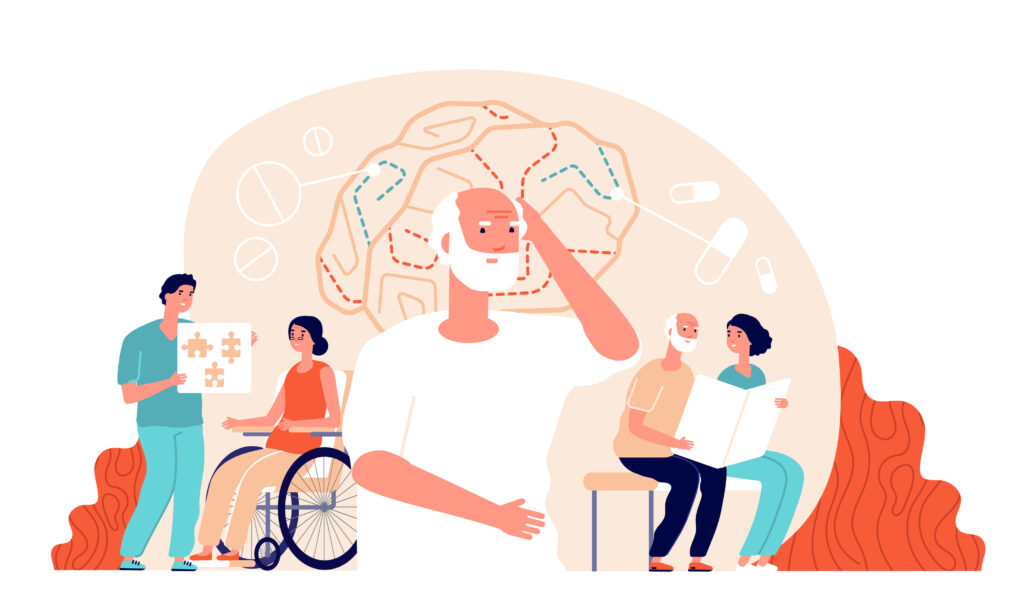It happens all the time: Older adults visit the ER for a heart attack without experiencing chest pains, or pneumonia without a fever or cough.
“Everything presents differently in seniors,” said Victoria Braund, MD, FACP, director of the division of Geriatrics, NorthShore University HealthSystem headquartered in Evanston, Illinois. “I joke with them, ‘It’s like you guys didn’t read the book.’”
The same holds true for urinary tract infections (UTIs). Whereas younger patients often experience the classic signs of a UTI – frequent urination, burning sensation while urinating, blood in urine, cloudy urine, fever, chills or nausea – older adults may not experience those symptoms at all.
Instead, their behavior may change suddenly. They may act confused, disoriented and agitated, become sleepy and unable to rouse awake. They may completely lose their appetite and, in extreme cases, hallucinate, for example, that someone is trying to break into their home or hurt them. Oftentimes, adult children mistake these abrupt changes in behavior for signs of dementia—which is when physicians like Braund have to educate them.
Dementia is a group of conditions that includes Alzheimer’s, vascular dementia and Lewy body dementia—conditions that slowly progress and lead to a decline in cognition, said Ryan Bartkus, MD, attending in geriatric medicine at Alexian Brothers Medical Center in Elk Grove Village, Illinois. Dementia doesn’t reveal itself overnight. In time, doctors see declines in how a patient’s mind works and the daily tasks they’re able to do.
“It takes place over a course of years,” Bartkus said. “From the time of diagnosis to the end, on average, eight years.”
The reason UTIs and other infections or illnesses affect older adults differently has to do with their brain’s ability to weather stress on the body, a situation he refers to as “cognitive reserve.”
“When we’re young and relatively healthy, we don’t have an accrual of medical conditions and we have a lot of cognitive reserve,” Bartkus explained. “I’m 37 years old. If I got a UTI, my brain has enough reserve to weather stress on my body. I won’t get confused. I’ll be uncomfortable.”
Not so for older adults and even worse for patients with dementia because they have more rapid changes in memory and less cognitive reserve. Anything from constipation to severe pain to a thyroid disorder can add extra stress to the body and the brain, Bartkus explained.
“In an older person with dementia or a medical history, their cognitive balance gets thrown off and they often become confused and more disoriented.”

Watch out for delirium
A Latin term for “off the track,” delirium is a signal the patient needs urgent medical attention, Braund explained. The two types of delirium include hypoactive delirium, which is when the patient becomes sleepy and is unable to rouse awake, and also stops eating; and hyperactive delirium, which is when they become confused, agitated and may hallucinate.
“Delirium can wax and wane over the course of a day,” she said. “I’ll make rounds in the morning and they’re eating breakfast, nice and calm, and I’ll come back in the afternoon and they’re pulling out their IV, biting and kicking. The nurses call it sundowning. It’s a sign the brain is not happy and something is going on to make that brain unhappy.”
Any change in an older adult’s demeanor, thinking or functioning signals an urgency to call their health care provider and talk through whether or not they need to go to the ER, Braund warned.
“A UTI is an infection. You wouldn’t want someone to sit on that for three days until they got into the office. You want to get going.”
If left untreated, sometimes UTIs can go away by themselves or they can linger and, worst-case scenario, cause an infection in the kidneys, bacteria in the bloodstream and lead to sepsis—a catastrophic reaction to an infection that can result in hospitalization and potentially death, she said. (Jim Henson, creator of The Muppets, died of sepsis in his 40s from a strep infection.)
UTIs are treated with antibiotics, and within days of getting cleared up (or sometimes a little longer, the cognitive symptoms disappear and the patient returns to their typical behavior.
Diagnosis of a UTI
To diagnose a UTI, Bartkus will gather the patient’s history, determine timelines, ask about what has changed and ask about symptoms.
“I will ask a series of basic questions to gauge a patient’s ability to see how oriented they are and find out if they are more disoriented than usual,” he said.
He looks for a change in attention span, checking their short-term memory by having them review a few words and recite them back minutes later. He may have them say the months of the year in forward and backward order or count down to 100 by sevens to force them to concentrate. If they have significant difficulties concentrating, he suspects their attention is affected.
“Oftentimes when older patients come to us confused, we might not be able to localize what causes it based on history,” Bartkus said. “So, we send out a wide net to look for things that cause confusion.”
He conducts blood and urine tests to check sodium and electrolyte levels, looks for changes in liver function, and watches for elevated white blood cell counts.
Symptoms vary based on gender
UTIs are more prevalent in females than males because a woman’s urethra, the superhighway that leads from the bladder to outside the body, is very short.
“As we get older, the body cannot protect that tube so bacteria enter the bladder much more easily and our immune systems may have changed,” Braunder said. “In men, they have the prostate issue. A UTI in men is generally because they’re not emptying their bladder completely and they’re getting a blockage of urine retention.”

Preventing UTIs
As a caregiver, you can help your loved one prevent a UTI in a number of ways, and it starts with hygiene, Braunder said: Wipe from front to back after toileting and wash down there while showering. Also, encourage them to stay hydrated to keep urine diluted because bacteria are drawn to concentrated urine. They can drink water, Gatorade and any non-alcoholic beverages they like.
If a woman is having recurrent infections, Braunder recommends seeing a urogynecologist for an evaluation because it’s not a hopeless situation.
“I try to tell older patients, ‘If there’s an acute change in something, we want to know about it. Call us,’” she said. “If somebody cannot keep their eyes open or carry on a conversation, it’s a symptom that something is really wrong.”
Eventually, older adults who suffer regular UTIs show patterns in their behavior. If you pay attention to the sudden onset of that pattern and catch a UTI early, the sooner it can be treated, the better.

